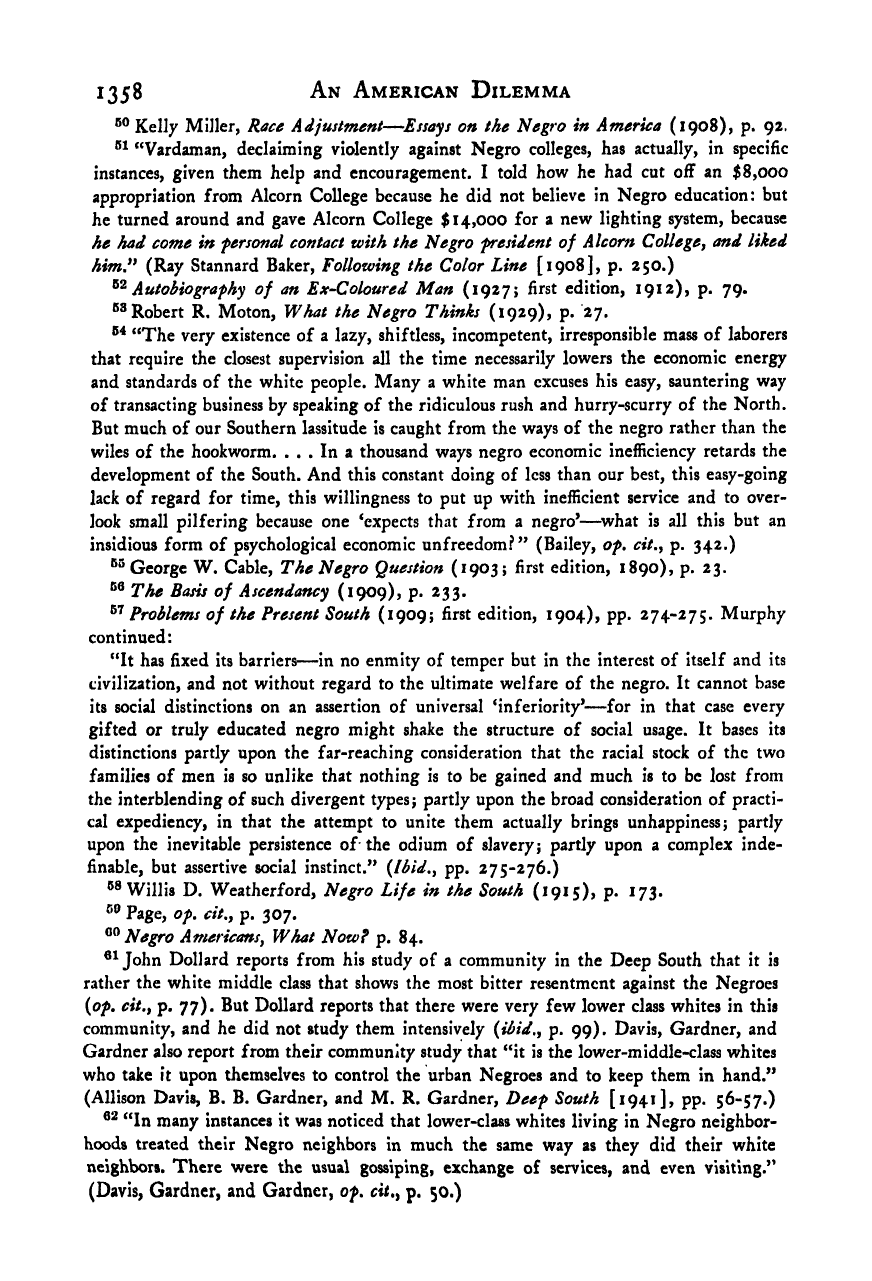Note: Gunnar Myrdal died in 1987, less than 70 years ago. Therefore, this work is protected by copyright, restricting your legal rights to reproduce it. However, you are welcome to view it on screen, as you do now. Read more about copyright.
Full resolution (TIFF) - On this page / på denna sida - Footnotes - Chapter 28

<< prev. page << föreg. sida << >> nästa sida >> next page >>
Below is the raw OCR text
from the above scanned image.
Do you see an error? Proofread the page now!
Här nedan syns maskintolkade texten från faksimilbilden ovan.
Ser du något fel? Korrekturläs sidan nu!
This page has never been proofread. / Denna sida har aldrig korrekturlästs.
1358 An American Dilemma
Kell/ Miller, Race Adjustment—Essays on the Negro in America (1908), p. 92.
“Vardanian, declaiming violently against Negro colleges, has actually, in specific
instances, given them help and encouragement. I told how he had cut ofiF an $8,000
appropriation from Alcorn College because he did not believe in Negro education: but
he turned around and gave Alcorn College $14,000 for a new lighting system, because
he had come in fersonal contact with the Negro ^president of Alcorn College^ and liked
him** (Ray Stannard Baker, Following the Color Line [1908], p. 250.)
Autobiography of an Ex^Coloured Man (1927; first edition, 1912), p. 79.
Robert R, Moton, What the Negro Thinks (1929), p. 27.
64
“The very existence of a lazy, shiftless, incompetent, irresponsible mass of laborers
that require the closest supervision all the time necessarily lowers the economic energy
and standards of the white people. Many a white man excuses his easy, sauntering way
of transacting business by speaking of the ridiculous rush and hurry-scurry of the North.
But much of our Southern lassitude is caught from the ways of the negro rather than the
wiles of the hookworm. ... In a thousand ways negro economic inefficiency retards the
development of the South. And this constant doing of less than our best, this easy-going
lack of regard for time, this willingness to put up with inefficient service and to over-
look small pilfering because one ‘expects that from a negro*—^what is all this but an
insidious form of psychological economic unfreedom?** (Bailey, of» cit,y p. 342.)
George W. Cable, The Negro Question (1903; first edition, 1890), p. 23.
The Basis of Ascendancy (1909), p. 233.
Problems of the Present South (1909; hrst edition, 1904), pp. 274-275. Murphy
continued:
“It has fixed its barriers—in no enmity of temper but in the interest of itself and its
civilization, and not without regard to the ultimate welfare of the negro. It cannot base
its social distinctions on an assertion of universal ‘inferiority*—for in that case every
gifted or truly educated negro might shake the structure of social usage. It bases its
distinctions partly upon the far-reaching consideration that the racial stock of the two
families of men is so unlike that nothing is to be gained and much is to be lost from
the interblending of such divergent types j
partly upon the broad consideration of practi-
cal expediency, in that the attempt to unite them actually brings unhappiness; partly
upon the inevitable persistence of the odium of slavery; partly upon a complex inde-
finable, but assertive social instinct.’* {Ibid,^ pp. 275-276.)
Willis D. Weatherford, Negro Life in the South (191 5)> p. 173.
Page, op, cit,y p. 307.
Negro Americans^ What Now? p. 84.
John Dollard reports from his study of a community in the Deep South that it is
rather the white middle class that shows the most bitter resentment against the Negroes
{op, cit,, p. 77). But Dollard reports that there were very few lower class whites in this
community, and he did not study them intensively (ibid,, p. 99). Davis, Gardner, and
Gardner also report from their community study that “it is the lower-middle-class whites
who take it upon themselves to control the urban Negroes and to keep them in hand.**
(Allison Davis, B. B. Gardner, and M. R, Gardner, Deep South [1941], pp. 56-57.)
“In many instances it was noticed that lowcr-cla&s whites living in Negro neighbor-
hoods treated their Negro neighbors in much the same way as they did their white
neighbors. There were the usual gossiping, exchange of services, and even visiting.”
(Davis, Gardner, and Gardner, op, cit,y
p. 50.)
<< prev. page << föreg. sida << >> nästa sida >> next page >>